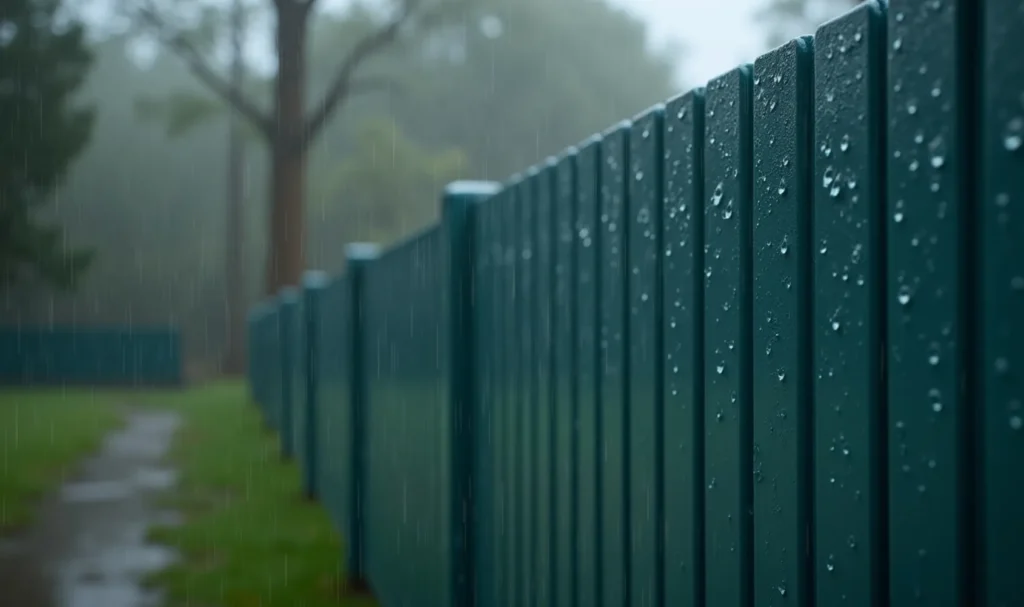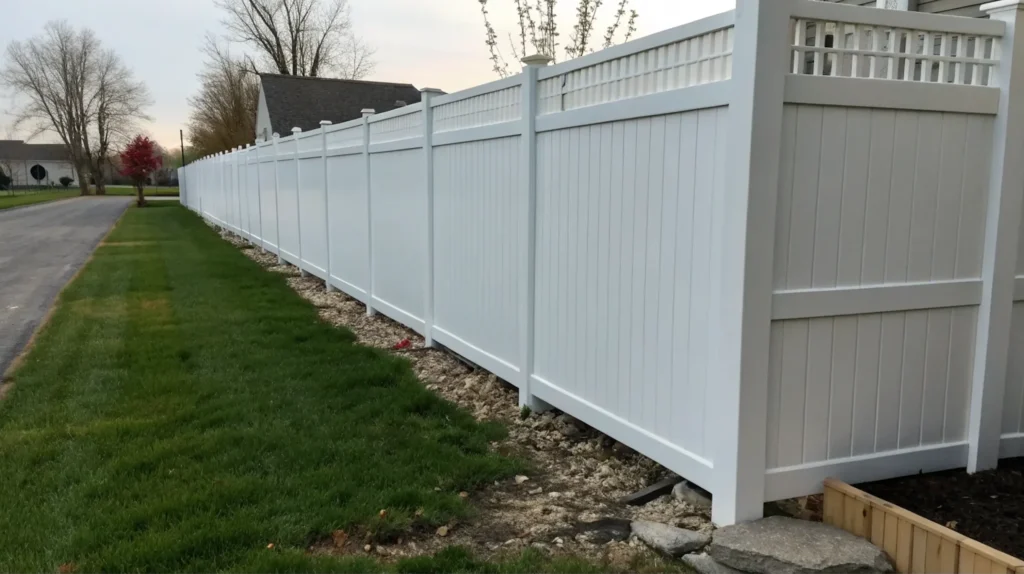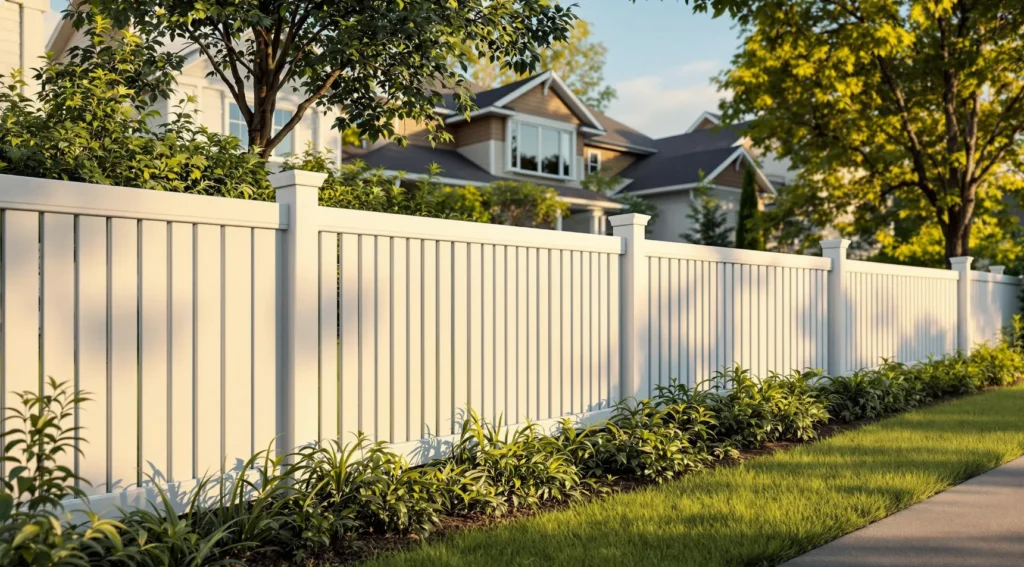Introduction
When considering options for enclosing your property, vinyl fencing emerges as a popular pick for homeowners and business establishments alike. But what makes it so appealing? In this article, we will delve into the 5 key benefits of installing a vinyl fence. From aesthetics to long-lasting durability, the advantages of vinyl fencing are hard to overlook.
Vinyl fencing has gained a reputation for providing reliable and attractive solutions for property owners. Whether you need privacy, a decorative touch, or protection from wind and other elements, this material delivers on many fronts. But stick around! We’re going to uncover each of the major benefits this fence type offers.
What is Vinyl Fencing?
Vinyl fencing is constructed from polyvinyl chloride (PVC), a synthetic plastic polymer that's molded into various styles and colors. It's considered a modern alternative to traditional wooden fencing. Unlike wood, vinyl fences do not require the same level of maintenance or replacement over time.
The beauty of vinyl lies in its versatility. Homeowners can choose from a wide range of designs, including picket, privacy, and semi-privacy styles. Plus, the various colors and textures mean that a vinyl fence can easily complement any home exterior.
Given its wide acceptance in neighborhoods, vinyl fencing has gained immense popularity. You’ll often find it used in both residential yards as well as commercial properties. This fence type offers a clean look that enhances the overall appearance of your landscape without appearing overly cumbersome.
The Benefits of Vinyl Fencing
Vinyl fencing comes with an array of benefits that make it a valuable investment:
- Durability: Unlike wood, vinyl is tough and resistant to warping, cracking, and rotting. This means your investment will last longer and remain visually appealing over time.
- Low Maintenance: If you’re not fond of endless weekends spent maintaining your property, vinyl fencing is a perfect fit. It requires minimal upkeep and can simply be cleaned with soap and water.
- Eco-Friendly Option: Vinyl fencing is often made from recycled materials, making it an environmentally friendly choice. Moreover, it’s recyclable itself, which means it can be repurposed later!
- Aesthetic Appeal: With countless designs and styles available, vinyl fencing can elevate the curb appeal of your home. Choose a contemporary look or a classic design that harmonizes with your dwelling.
- Affordability: While vinyl fencing may cost a bit more upfront compared to wood, its low maintenance needs and longevity make it a cost-effective solution in the long run.
Why Choose Vinyl Fencing Over Wood
While wooden fences have a classic charm, they come with a host of maintenance requirements that vinyl simply does not. Wood must be regularly stained, painted, or treated to prevent decay and insect infestation. Vinyl fencing, on the other hand, is resistant to such issues, allowing you to enjoy its beauty without the hassle.
Additionally, wood fences can degrade due to weather conditions, insects, or rot, which may require costly repairs or replacement. In contrast, a vinyl fence retains its shape and color over time, regardless of exposure to moisture, heat, or cold.
In the end, the choice boils down to your lifestyle and preferences. If you desire a low-maintenance, lasting solution that still looks great, vinyl fencing is worth the investment.
Vinyl Fencing Durability
One of the standout features of vinyl fencing is its incredible durability. Built to withstand the worst of nature, vinyl fences are resistant to severe weather conditions, making them ideal for climates that experience extreme temperatures, heavy rain, or high winds. Unlike wooden fences that may warp or splinter, vinyl maintains its integrity over the years.
Many manufacturers offer warranties that cover their vinyl products for several decades. This speaks volumes about their confidence in longevity. The material itself is not only tough but also flexible, reducing the chances of cracking during harsh weather.
Additionally, vinyl fencing is resistant to fading, discoloration, and staining, which can be more common with wood. Even under the sun’s harsh rays, a vinyl fence retains its vibrant color, so you won’t have to worry about re-staining or painting it every few years.
In summary, if you seek a fencing solution built to endure, look no further than vinyl.
Low Maintenance Needs of Vinyl Fencing
One of the primary advantages of choosing vinyl fencing is its minimal maintenance requirements. Imagine installing a fence and hardly having to think about it again! Compared to wood fencing, which may require annual or bi-annual treatments, vinyl requires almost none.
A simple wash with soap and water will suffice to keep your vinyl fence looking fresh and new. It does not suffer from corrosion, rust, or termite damage. This frees up your weekends for more enjoyable activities instead of repairing or staining your fence.
Moreover, there is no need for special cleaning agents or equipment. Just grab a hose, some mild detergent, and a soft brush, and you’ll achieve sparkling results effortlessly.
So, if you prefer to spend less time on upkeep and more time enjoying your outdoor space, vinyl fencing is the perfect solution.
Eco-Friendliness of Vinyl Fencing
When it comes to sustainability, vinyl fencing stands out as an eco-friendly choice. Many vinyl products are made from recycled materials, reduced carbon emissions during production, and contribute to the circular economy.
Additionally, vinyl fencing is recyclable. At the end of its life cycle, it can be repurposed, resulting in less waste. In contrast to wood fences that may end up in landfills due to rot or decay, vinyl offers a greener alternative.
By choosing vinyl, you are not only making a choice that benefits your immediate surroundings but also taking a step toward a more sustainable future. It’s a win-win!
Aesthetics: The Beauty of Vinyl Fencing
Vinyl fences come in an incredible array of colors and styles, allowing homeowners to select the ideal match for their property. From classic white to vibrant hues, there’s something for everyone. Unlike wood fences that typically experience wearing or warping over time, vinyl fences maintain a fresh appearance effortlessly.
You can also take advantage of decorative caps, lattice designs, and various post styles to create an elegant look tailored to your tastes. This customization option sets vinyl apart from traditional fencing materials, allowing you to express your style without compromise.
Additionally, unlike wooden fences that may splinter or age unevenly, vinyl's consistent texture and finish ensure your fence looks just as stunning years down the line. Enhance your home’s aesthetic appeal with a vinyl fence!
Cost-Effectiveness of Vinyl Fencing
While vinyl fencing may come with a higher initial price compared to wood, its long-term performance solidifies it as a cost-effective solution. When you factor in the expenses of painting, staining, and replacing traditional wooden fences, the lower maintenance costs plot a clear financial advantage for vinyl.
Because vinyl fences are built to last, you won’t have to worry about recurring expenses. The total cost of ownership will likely be lower when you choose vinyl, providing peace of mind.
Ultimately, the durability and longevity of vinyl fencing make it an excellent investment for any property.
How to Choose the Right Vinyl Fence
Choosing the right vinyl fence involves several considerations. Start by examining your needs: do you prefer privacy, security, or aesthetic appeal? Depending on your needs, there are specific styles such as privacy fences or decorative picket fences to consider.
Next, consult with a reputable vinyl fencing supplier or contractor. They’ll guide you in selecting the right color, style, and height of the fence based on local regulations and your personal taste.
Also, don’t forget to check for certifications or warranties from manufacturers. A solid warranty usually indicates a good-quality product.
In summary, a bit of research and consultation goes a long way in selecting the perfect vinyl fence for your property.
Types of Vinyl Fencing
When it comes to types, vinyl fencing offers various options tailored to meet different needs:
- Privacy Fencing: Ideal for areas needing protection from prying eyes, privacy fences are solid and tall, providing a sense of seclusion.
- Picket Fencing: A classic option for decorative purposes, picket fencing is low in height and provides a welcoming touch while delineating boundaries.
- Semi-Privacy Fencing: This style allows for some visibility while still offering a degree of privacy, striking the perfect balance.
- Ranch Rail Fencing: Popular for larger properties, ranch rail fences provide an open look while marking boundaries. They often consist of two or three horizontal rails.
Choosing the right type ultimately depends on your personal preferences and purpose.
Installation Process of Vinyl Fencing
Installing vinyl fencing is typically a straightforward affair, but taking the time to plan can make all the difference. The installation process usually involves:
- Planning and Measuring: Define the area where you want the fence to be installed. Confirm property lines and determine if permits are necessary.
- Materials Gathering: Purchase the necessary tools (such as post-hole diggers, levels, and fencing panels), along with the vinyl fencing itself.
- Setting Posts: It begins by digging holes for the fence posts. Proper spacing is crucial to ensure the fence is stable.
- Attaching Panels: After the posts are set and the concrete hardens, affix the panels to the posts, confirming alignment in the process.
- Final Touches: Install caps or embellishments if applicable, and review the finished product for any adjustments.
While many homeowners choose to tackle the job themselves, hiring a professional can ensure a hassle-free experience.
Common Applications for Vinyl Fencing
Vinyl fencing finds its place in an array of applications. Some common uses include:
- Residential Properties: Homes use vinyl fences for privacy, protection, and enhanced landscape appeal.
- Commercial Properties: Businesses often opt for vinyl due to its durability and low upkeep, creating secure and visually pleasing environments.
- Pool Enclosures: Vinyl is very popular for fencing around pools as it offers safety features while being resistant to moisture and water.
- Animal Enclosures: Utilizing vinyl for livestock or pet areas can provide both security and a humane environment.
With versatile applications, vinyl fencing continues to be a widely chosen option among property owners.
Vinyl Fencing vs. Other Fencing Materials
When comparing vinyl fencing to other materials, the differences become evident.
- Wood Fencing: While wood carries a natural look, it requires constant maintenance and is subject to rot and pest infestation.
- Metal Fencing: Metal may offer durability, but it often lacks aesthetic variety and can be more costly to maintain.
- Chain Link Fencing: Although affordable, chain link fencing does not provide privacy and can appear stark.
Ultimately, the versatility, durability, and visual appeal of vinyl fencing position it as a premier choice among fencing options.
Vinyl Fencing in Different Climates
Vinyl fencing excels across various climates. Unlike wood or metal, which may warp in heat or rust in damp conditions, vinyl remains stable in various weather conditions.
For areas with high humidity or precipitation, vinyl’s resistance to moisture prevents rot or decay. Alternatively, in extremely hot climates, its durability and color-fast qualities ensure it maintains its appearance over time without requiring repainting or restaining.
In regions experiencing vast temperature fluctuations, vinyl’s flexibility prevents cracking or splitting, ensuring it stands the test of time in even the most unpredictable weather.
Questions to Ask Your Vinyl Fencing Contractor
Before finalizing a contract, ensure you ask the following questions:
- What types of vinyl fencing do you offer?
- Can you provide references or examples of your previous work?
- What warranties do you provide on your products and installation?
- How long will the installation process take?
- Are there any permits or regulations I should be aware of?
- What maintenance is required, if any?
Being informed before making a commitment ensures you select the right contractor for your vinyl fence installation.
Vinyl Fencing Maintenance Tips
While vinyl fencing is low maintenance, some simple steps can help prolong its life span:
- Regular Cleaning: Clean it yearly with soap and water. This prevents dirt buildup and keeps it looking fresh.
- Check for Damage: Occasionally inspect your fence for any cracks or chips, and take action immediately if you notice anything.
- Trim Vegetation: Keep plants or bushes trimmed away from the fence to avoid overgrowth, which may cause discoloration.
Simple steps ensure that your vinyl fence continues to provide beauty and protection for years to come.
Are There Any Drawbacks to Vinyl Fencing?
While vinyl fencing boasts numerous advantages, it also has a few drawbacks to consider.
- Initial Cost: Vinyl can be pricier upfront, which might deter some property owners.
- Limited Color Options: While colors are numerous, they may be limited somewhat compared to wood stains or paints.
- Potential for cracking: Although rare, the material can be prone to cracking in extreme cold conditions if not manufactured appropriately.
Being aware of these drawbacks ensures you make a well-informed decision while navigating the fencing landscape.
Frequently Asked Questions about Vinyl Fencing
What is the lifespan of a vinyl fence?
Vinyl fences typically last 20-30 years or more with proper maintenance, significantly surpassing wood.
Does vinyl fencing fade in the sunlight?
Most vinyl fencing products resist fading, thanks to UV stabilizers that protect against sun damage.
How much does vinyl fencing cost?
The price can vary based on style and installation, but expect to pay more upfront than wood while saving in the long run.
Can I install vinyl fencing myself?
Yes, with the right tools and plans. However, hiring professionals ensures the job is done correctly.
Is vinyl fencing safe for pets?
Absolutely! Vinyl fencing provides a secure environment for pets while ensuring visibility.
Do I need permits for vinyl fencing installation?
In some areas, permits are required. Check local regulations before starting your project.
Conclusion
Vinyl fencing offers a myriad of benefits, making it a fantastic choice for property owners looking for a long-lasting, beautiful, and low-maintenance fencing solution. From its striking aesthetics to its eco-friendly features, vinyl fencing enhances the landscape while providing reliability and security.
If you're still unsure, consider the factors we discussed and speak to a qualified contractor who can provide tailored advice fitting your needs. The advantages of vinyl fencing are clear, and it could be the perfect solution to transform your property and enhance its value for years to come. Choose wisely, and enjoy the peace of mind that comes with having an effective fencing solution in place.



